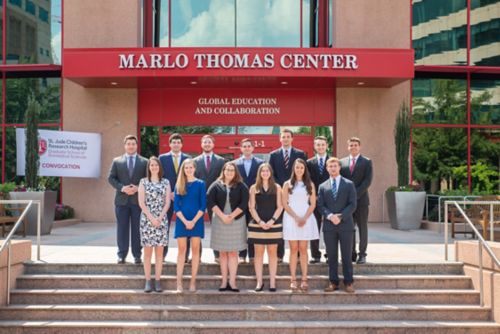Graduate School Welcomes 2019 Class
The graduate school officially welcomes its third class of biomedical PhD students and its first class of Global Child Health master’s students.
Amid the kaleidoscopic pomp of academic regalia and a stirring bagpipe processional, 23 new graduate students were officially welcomed into the St. Jude family at the Third Convocation of the St. Jude Graduate School of Biomedical Sciences. Stephen White, DPhil, president and dean of the school, led the event, which introduced 13 new biomedical PhD students and 10 students in the new Master’s Program in Global Child Health.
A growing number of U.S. institutions hold academic convocations at the beginning of each school year to welcome new students. A convocation symbolically picks up where the new students’ previous graduation exercises left off. Instead of receiving diplomas, students sign the institution’s “matriculation book,” formally committing themselves to their ongoing education.
James R. Downing, MD, St. Jude president and CEO, delivered a welcome address, noting how the Graduate School’s pre-opening success in student recruitment brought back stories he had heard about the founding of the hospital.
“Dr. Donald Pinkel was recruiting people when St. Jude was still a plot of land with one building going up,” Downing said. “The accomplishments of that early generation are unbelievable, introducing the word ‘cure’ to pediatric cancer in less than a decade. That’s a legacy that continues with you--challenging faculty to think differently about the problems we pursue and the methods that we use.”

Gabriel Haddad, MD, chair of Pediatrics at the University of California, San Diego and a member of both the St. Jude Board of Governors and the Graduate School Board of Trustees, delivered the keynote address.
“There is much more ahead of us than behind us, and we expect great things from you—no pressure!” Haddad said, with a smile. “You just need courage to do what you love and to stick with it. St. Jude has long been a natural environment for discovery, as clinicians and researchers work side-by-side to take questions from the bedside and solve them at the bench.”
Third-year PhD candidate Christina Kackos welcomed the new cohort on behalf of the student body and summarized what to expect in the coming months, both academically and culturally.
“In our first year we learned how to read and analyze scientific literature; to question results and design experiments that answer those questions,” Kackos explained. “I don’t think anyone could have predicted the sense of community and family we have formed. We are friends: We go camping, celebrate birthdays and have movie nights.”
Clinicians living around the world are now being trained by St. Jude to facilitate delivery of timely, comprehensive and effective health care programs to children in need.
Shaloo Puri, MD, who heads the Global Child Health Master’s program, introduced the class who were attending via livestream in their home countries.
The program’s fall and spring semesters are held online, based on a flexible learning model. Flexibility is important: the students live and work in 10 countries, scattered across eight time zones. They spend six weeks in Memphis each year for intensive workshops and thesis seminars.
Dean White commended Kackos, along with Maria Smith and Ana Vazquez-Pagan, for presenting research-in-progress this summer in Singapore at the 10th Options for the Control of Influenza conference.
White also announced that Caitlin Zebley, MD, is the first St. Jude graduate student to receive a National Institutes of Health research grant. Zebley is investigating specificity determinants for CD8 T-Cell epigenetic reprogramming in the lab of Ben Youngblood, PhD, Department of Immunology.
Mackenzie Bloom was recognized as Third-Year Student of the Year. Benjamin Wilander was named Second-Year Student of the Year. The student body recognized three scientists for excellence in teaching: